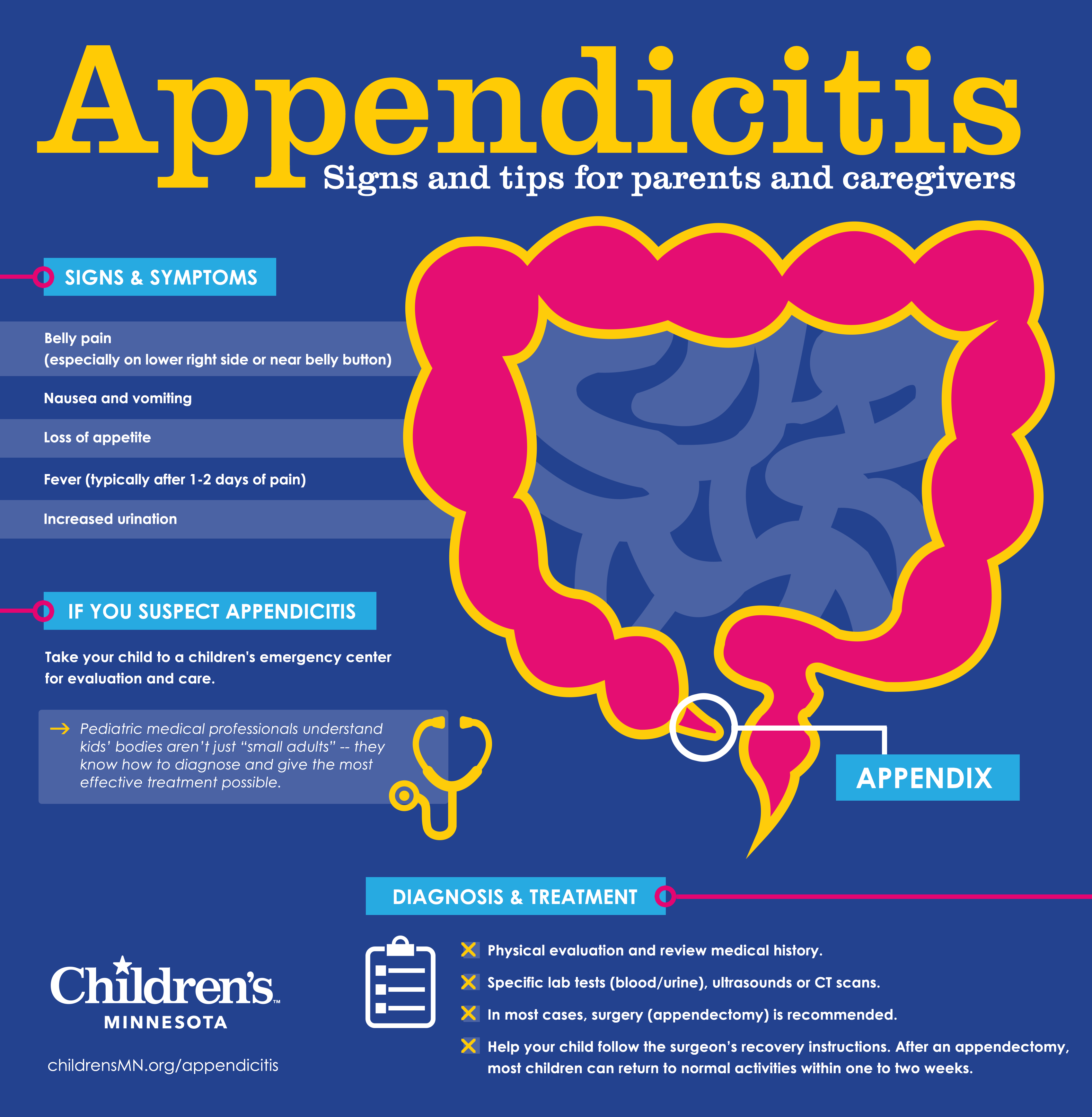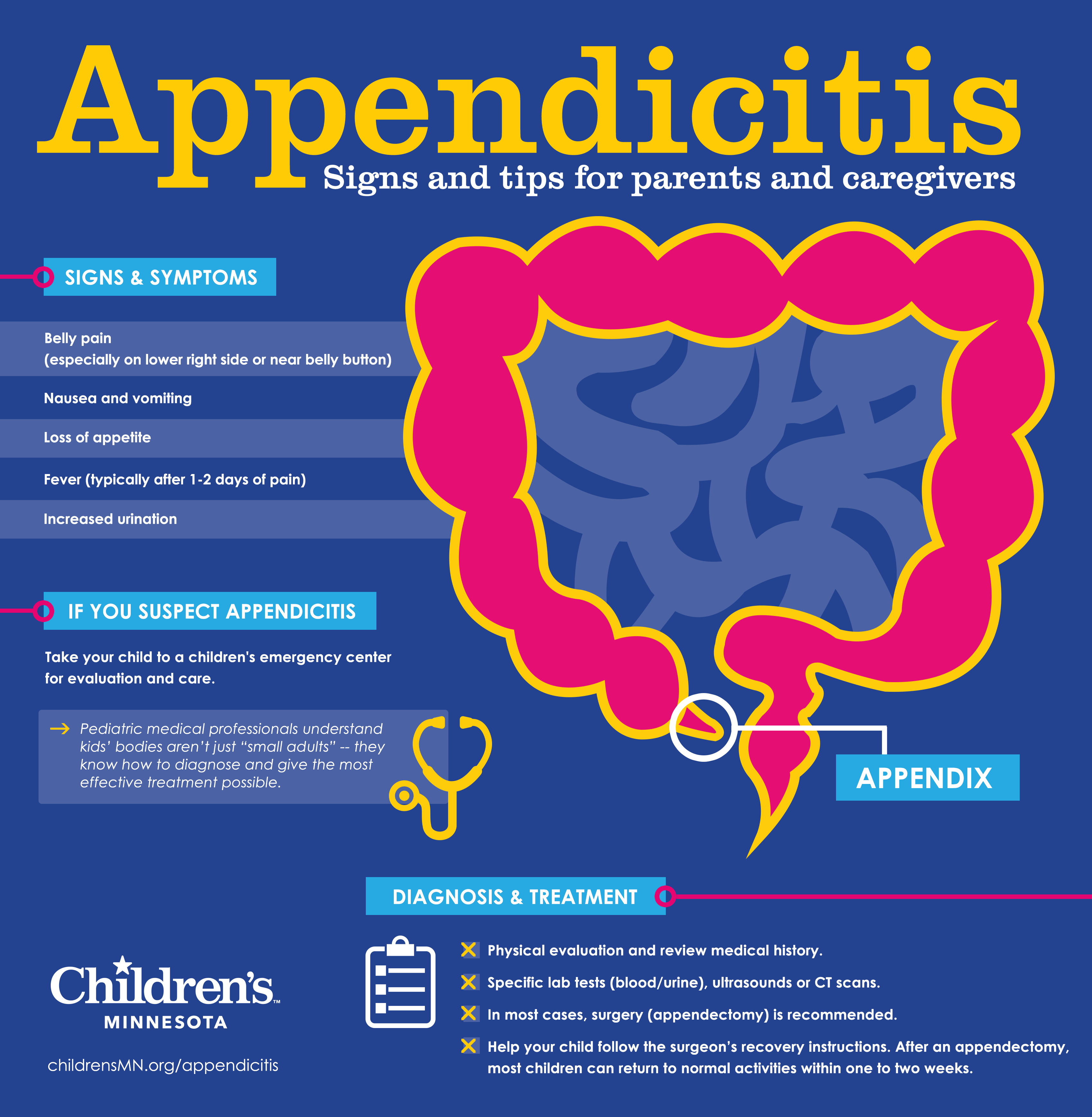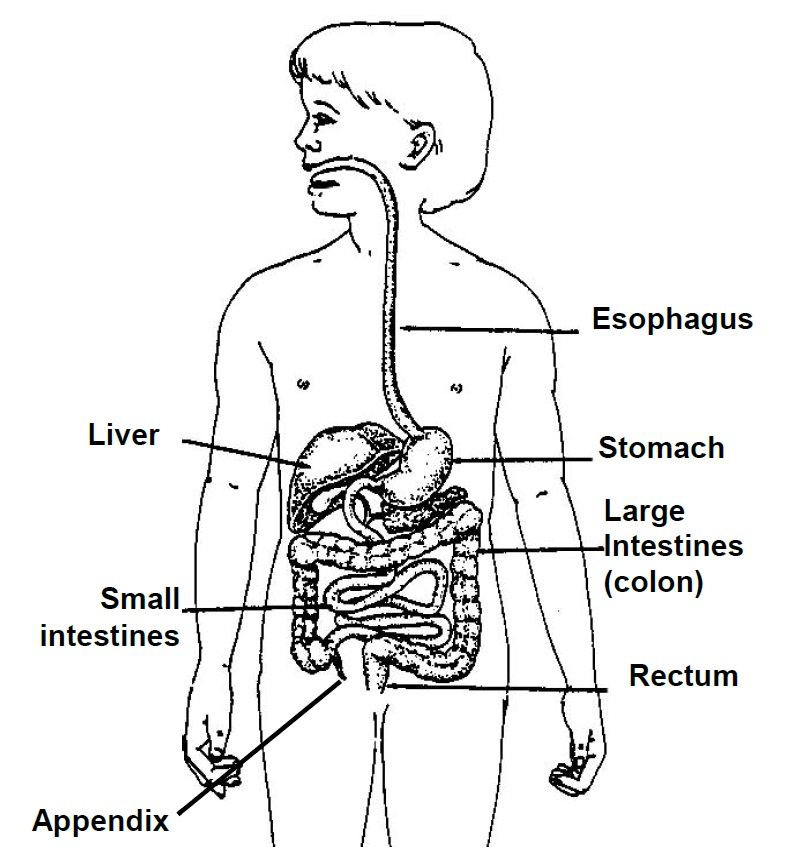Appendicitis In Kids

Contents:
- Cause Appendicitis In Children
- Symptoms Appendicitis In Babies
- Treatment Appendicitis In Kids
- The Post-operative Period
- Prognosis And Prevention Appendicitis In Children
Appendicitis is an acute (more rarely, subacute, chronic) inflammation in the vermiform appendix (appendix). Appendicitis in case of children is accompanied by pains in the belly, vomiting that occurs once or twice, frequent bowel movements, temperature, decrease of activity and anxiety. The process of diagnosing the disease in children includes palpation of the belly, rectal-finger examination, the study of general blood and urine tests, ultrasound examination, radiography or CT of the abdominal space, diagnostic laparoscopy. In order to diagnose appendicitis in children there is a need to carry out appendectomy, it’s better be carried out laparoscopically.
Cause Appendicitis In Children
Sometimes, appendicitis in children develops because of the decreased capability of the immune system. If a weakened organism is exposed to viruses attack, it can’t fight them. As a result, infection gets into the vermiform appendix of the blind intestine and causes its inflammation.
Since the nervous system of the vermiform appendix in case of children is immature yet, a vast number of diseases (tonsillitis, ARVI, otitis etc.) may contribute to a faster development and occurrence of acute appendicitis as well as a severe course of the disease.
One more reason for the appendicitis in children are exterior bodies (seeds’ hull, fish bones) or parasites (helminthes) that get into the bowel.
Symptoms Appendicitis In Babies

It is known that due to the fact that the nervous system is immature, little kids can’t explain where and how something hurts. That’s why it’s so important to pay attention to the so-called circumstantial symptoms of the disease. As a rule, children become flabby, they stop playing and lose interest in toys. A child tries to protect the area where there is a strong pain in any way possible. He or she crosses legs and lies down on side. When you take your child in your arms, he or she starts crying more. An older child already can explain what’s bothering him or her and can show where the pain is located.
Sometimes, unpleasant sensations start in the upper part of the belly and gradually go down. Appendicitis in case of children may shoot up small of the back area, sexual organs and anus that’s why a child can’t understand what exactly is bothering him or her.
The attack lasts for several hours. Then, the pain gradually subsides because the nervous system of the vermiform appendix dies off. However, the problem is still here. The process gets worse and sometimes it leads to peritonitis – a spread inflammation of the abdominal space. All the belly starts to hurt, very often it is inflated there is also a possibility of gas or stool retention. Sometimes, the temperature is increased up to 40oC, the pulse gets faster, a child becomes flabby and pale. Such a condition may occur right after a child’s first complaints since in case of children everything develops rather fast.
That’s why in case of the very first suspicions that your child may have acute appendicitis, it’s necessary to call ambulance immediately. You need to remember that only a children’s surgeon can exclude the possibility of the disease. You shouldn’t search for the symptoms described above and waste time. Only doctors are to get busy with the diagnostics and treatment of the disease.
Things that are FORBIDDEN in case of appendicitis.
Warm hot-water bottle, baths, putting ice on the place where it hurts – all these things are forbidden, they only increase the speed of the inflammatory process. Besides, before a surgeon examines your child, it’s forbidden to make enema as well as giving him or her painkillers and purgatives.
The Symptoms Of Appendicitis In Children: The Examination Of A Child
In order to define that there is for sure a case of appendicitis there will be made a general blood test (blood will be taken from finger), his or her discharges will be studied (do not forget to keep the dirty diaper), and the belly will be palpated. If your kid looks anxious and doesn’t go on contact, the examination may be carried out while he or she is sleeping – even then the pain and muscle tension stay therefore a kid will push the hand of a doctor off. In order to carry out dynamic supervision that, if necessary, lasts for 6-12 hours a child needs to be hospitalized. Surgeon and general pediatrician at a time may supervise the child’s condition. If necessary, there may also be particular specialists – ophthalmologist, infection disease doctor etc. There may be a need to repeat tests. Then, they will decide whether operation is required or not.
There is a need for surgical operation? Try to calm down. Your anxiety will be passed on to your kid. Don’t worry about him or her – your kid won’t feel any pain since the operation is carried out under central anaesthesia. An hour after the operation, having appendicitis will be past. If there is a possibility, try to do so that your kid will see you once he or she is awake.
Treatment Appendicitis In Kids

If your kid is suspected of having appendicitis, an immediate hospitalization and examination are required. Under no condition, you should put hot-water bottle on the belly, make a cleaning enema or give painkillers and purgative.
If there is a case of an acute or chronic appendicitis in children of any age, it’s a 100% indication for surgical operation. In pediatrics, less traumatic laparoscopic appendectomy is a priority. It allows to shorten the time for the after operation recovery.
In case of appendicitis’ destructive forms, the period to prepare a kid before operation shouldn’t be longer than 2-4 hours. In this case, antibiotics are injected and infusion therapy is carried out. If there is a complicated appendicitis, an open appendectomy is carried out.
The Post-operative Period
After operation, the doctor of the kid supervises his or her condition. If a kid gets well fast, he or she is discharged from a hospital within 7-10 days. After that, there is a need to be registered at the surgeon’s at your local hospital. The surgeon will give further recommendations on treatment and do a dressing. During this period of time, it’s better to stay at home and not do any physical exercises. If the wound heals badly and complications occur, the period of treatment and visiting a surgeon may become longer.
After a kid is discharged from a hospital, he or she gets exemption from PE classes. He or she is forbidden to lift heavy things, run, jump do heavy work. However, you shouldn’t forget that there is a need to go around flat as much as possible, do the work that a kid can do otherwise adhesions will occur. While doing so, a kid will gradually come back to normal, active way of life.
The kid’s diet should be balanced. It is allowed to eat only natural products that will help the bowel to work. Give to your child vegetable dishes, porridges that have dietary fibre, dairy products, yoghurts and curd cheese in order to bring the functioning of the bowel back to normal and regulate stool.
It’s rare when the treatment of appendicitis doesn’t cause any complications. There may occur adhesives in the abdominal space after the pus processes. An adhesives’ disease may develop. The kids with appendicitis should be registered and supervised till they completely recover.
Prognosis And Prevention Appendicitis In Children
In case the operation is carried out on time, the prognosis is positive. After destructive forms of appendicitis an adhesives’ disease may occur. The fatality rate in case of appendicitis in children is 0,1-0,3%.
The right dietary regimen, keeping an eye on how regular bowel movements are and treatment of chronic inflammatory diseases are very important as preventive measures against appendicitis. You need to remember that appendicitis in children goes very fast and, very often, the course goes non-specifically. That’s why in case of any slight malaise (abdominal pains, dyspeptic disorders, increase of temperature) there is a need to consult general pediatrician.
Video: Appendicitis Symptoms In Children